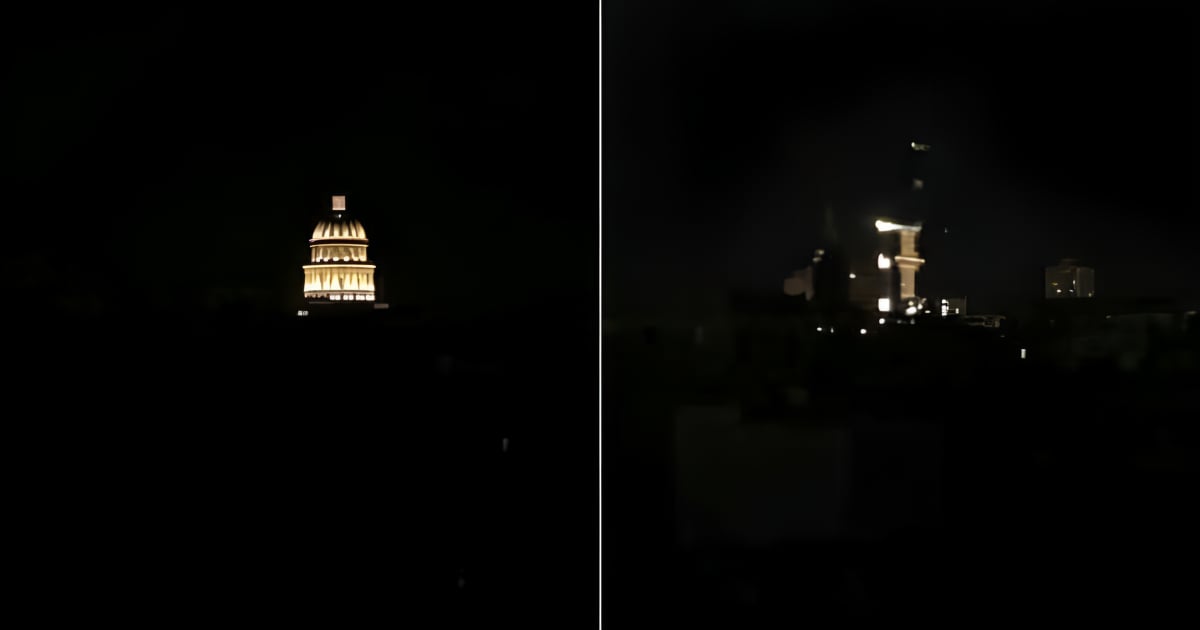A striking image of Havana has stirred up social media: amidst the darkness, only the Capitol and the K23 Tower Hotel remain lit, as the rest of the city appears to be engulfed in a blackout. These photographs, shared on Facebook by CubaNet News, sparked a wave of outrage and comments from Cubans who criticized the inequality in electricity supply and the daily hardships they face.
CiberCuba was unable to verify the exact duration or extent of the blackout, but comments suggest there were indeed power cuts affecting certain blocks. Photos received at this newsroom confirm that around 7 PM, buildings surrounding the K23 Tower were without power.
Capital vs. Provinces: The Power Struggle
Comments on CubaNet's post reveal that many believe Havana usually doesn't experience long power outages, unlike other provinces where blackouts can last over a day. The reactions from citizens displayed a mix of frustration, resignation, and skepticism. "This is the biggest disgrace in this country, plenty of light for tourists while the people drown in misery and darkness," wrote one user. Another lamented, "For God's sake, it's incredible that even the capital is going dark."
In a similar vein, one commenter warned about the dangers of such blackouts in a city with scarce public lighting: "Imagine, traffic accidents multiply. Traffic lights don't work, and you can't see the signs, which were already non-existent. This country is cursed!"
The Growing Energy Crisis in Cuba
Other comments reflected the resentment of residents from other provinces, who claim that the capital has historically been favored in terms of electricity supply. "It was about time Havana got its share of blackouts. Sadly, for all of Cuba, but provinces like Cienfuegos have lived in that agony for a while, with blackouts lasting 20 to 30 hours," stated a user who received numerous replies to her comment.
Some users supported her view, while others criticized her stance. "If you feel relieved because others lose power, you're very wrong. That won't improve your life," responded one user. Along the same lines, another expressed, "It's exhausting to see these narrow-minded people who rejoice when somewhere else loses power, as if it's Havana's people's fault that you don't have electricity."
There were also those who dismissed the image, suggesting it might be manipulated or exaggerated. "I'm sorry to say the photo is doctored. There was no blackout at that hour. They want to show something that isn't there," claimed a commenter subscribed to the "cognitive warfare" theory.
Calls for Action Amidst Social and Energy Crisis
On the other hand, some took the opportunity to denounce the lack of citizen action in the face of Cuba's energy and social crisis. "The people without power and they are enjoying," commented a Cuban woman, referring to the recent Habano Festival at the Capitol and the recent inauguration of the K23 Tower Hotel.
"The same people love all this masochism. If it were in another country, you'd see how they fight against all these government injustices," reflected another on the issue. Yet another compared the current situation to the era of slavery in Cuba: "In the times of slavery, only the master's house had all the luxuries. In the barracks, misery and hunger. What's the surprise? The master does enough letting them live, they deserve it."
Beyond the authenticity of the image, the situation has reignited the debate on Cuba's energy crisis, the collapse of the electrical system, and the government's lack of response. While some criticize the lack of fairness in service distribution, others call for action to demand profound changes in the country.
The energy crisis in Cuba has worsened in recent years due to the deterioration of thermoelectric plants, lack of investment in infrastructure, and reduced fuel supply. In several provinces, blackouts of more than 20 hours a day are a daily reality, while in the capital, although less frequent, they have become increasingly common.
Cuba's Energy Crisis: Key Questions
What is causing the energy crisis in Cuba?
The energy crisis in Cuba is primarily due to the deterioration of thermoelectric plants, lack of investment in infrastructure, and a reduced supply of fuel.
Are power outages common in Havana?
While power outages are generally less frequent in Havana compared to other provinces, they have become more common in recent times.
How long can blackouts last in Cuban provinces?
In some Cuban provinces, blackouts can extend for more than 20 hours a day, causing significant disruption to daily life.
